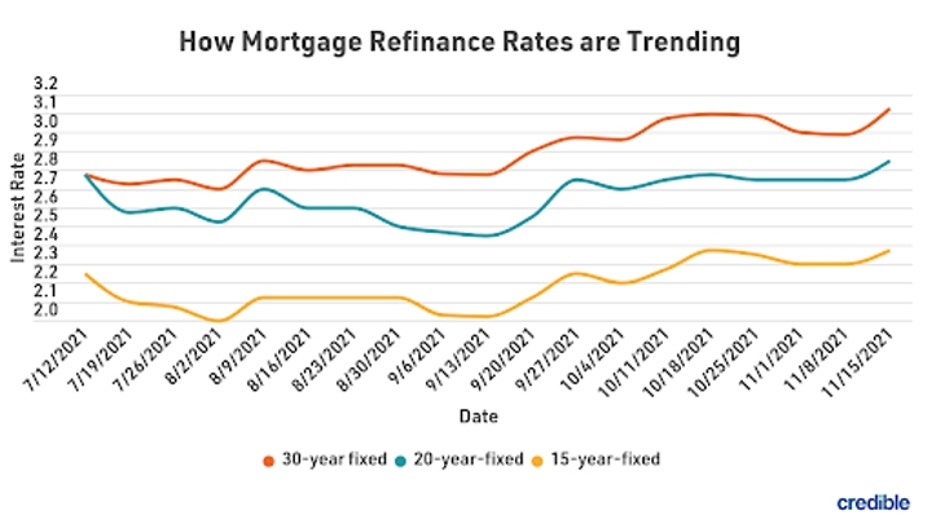3 key mortgage refinance rates linger at interest-savings lows | Nov. 24, 2021
Our goal here at Credible Operations, Inc., NMLS Number 1681276, referred to as "Credible" below, is to give you the tools and confidence you need to improve your finances. Although we do promote products from our partner lenders, all opinions are our own.

Check out the mortgage refinancing rates for Nov. 24, 2021, which are largely unchanged from yesterday. (iStock)
Based on data compiled by Credible, current mortgage refinance rates held steady across three terms since yesterday, but 30-year rates reached their highest level since Oct. 22.
- 30-year fixed-rate refinance: 3.250%, up from 3.125%, +0.125
- 20-year fixed-rate refinance: 3.000%, unchanged
- 15-year fixed-rate refinance: 2.500%, unchanged
- 10-year fixed-rate refinance: 2.375%, unchanged
Rates last updated on Nov. 24, 2021. These rates are based on the assumptions shown here. Actual rates may vary.
Homeowners looking to refinance into a shorter term may find today’s 10- and 15-year refinance rates the most attractive. Ten-year rates have held at just 2.375% for eight straight days, while 15-year rates have stuck at 2.500% for two days this week. While homeowners who choose a longer refinance term also stand to realize savings, shorter terms historically reduce total interest costs more than longer terms and allow borrowers to pay off their mortgages sooner.

These rates are based on the assumptions shown here. Actual rates may vary.
If you’re thinking of refinancing your home mortgage, consider using Credible. Whether you're interested in saving money on your monthly mortgage payments or considering a cash-out refinance, Credible's free online tool will let you compare rates from multiple mortgage lenders. You can see prequalified rates in as little as three minutes.
Current 30-year fixed refinance rates
The current rate for a 30-year fixed-rate refinance is 3.250%. This is up from yesterday. Refinancing a 30-year mortgage into a new 30-year mortgage could lower your interest rate, but may not have much effect on your total interest costs or monthly payment. Refinancing a shorter term mortgage into a 30-year refinance could result in a lower monthly payment but higher total interest costs.
Current 20-year fixed refinance rates
The current rate for a 20-year fixed-rate refinance is 3.000%. This is the same as yesterday. By refinancing a 30-year loan into a 20-year refinance, you could secure a lower interest rate and reduce total interest costs over the life of your mortgage. But you may get a higher monthly payment.
Current 15-year fixed refinance rates
The current rate for a 15-year fixed-rate refinance is 2.500%. This is the same as yesterday. A 15-year refinance could be a good choice for homeowners looking to strike a balance between lowering interest costs and retaining a manageable monthly payment.
Current 10-year fixed refinance rates
The current rate for a 10-year fixed-rate refinance is 2.375%. This is the same as yesterday. A 10-year refinance will help you pay off your mortgage sooner and maximize your interest savings. But you could also end up with a bigger monthly mortgage payment.
You can explore your mortgage refinance options in minutes by visiting Credible to compare rates and lenders. Check out Credible and get prequalified today.
Rates last updated on Nov. 24, 2021. These rates are based on the assumptions shown here. Actual rates may vary.
What is the average cost of a refinance?
Refinancing a mortgage can yield significant interest savings over the life of a loan. But all those savings don’t come for free. Generally, you’ll encounter costs — $5,000 on average, according to Freddie Mac — when refinancing your mortgage.
Your exact refinancing costs will depend on multiple factors, including the size of your loan and where you live. Typical refinancing costs include:
- The cost of recording your new mortgage
- Appraisal fees
- Attorney fees
- Lender fees, such as origination or underwriting
- Title service fees
- Credit report fees
- Mortgage points
- Prepaid interest charges
Keep in mind there’s no such thing as a truly no-cost refinance. Lenders who market "no-cost loans" typically charge a higher interest rate and roll the costs into the loan — which means you’ll pay more interest over the life of the loan.
How to get your lowest mortgage refinance rate
If you’re interested in refinancing your mortgage, improving your credit score and paying down any other debt could secure you a lower rate. It’s also a good idea to compare rates from different lenders if you're hoping to refinance, so you can find the best rate for your situation.
Borrowers can save $1,500 on average over the life of their loan by shopping for just one additional rate quote, and an average of $3,000 by comparing five rate quotes, according to research from Freddie Mac.
Be sure to shop around and compare rates from multiple mortgage lenders if you decide to refinance your mortgage. You can do this easily with Credible’s free online tool and see your prequalified rates in only three minutes.
How does Credible calculate refinance rates?
Changing economic conditions, central bank policy decisions, investor sentiment and other factors influence the movement of mortgage refinance rates. Credible average mortgage refinance rates are calculated based on information provided by partner lenders who pay compensation to Credible.
The rates assume a borrower has a 740 credit score and is borrowing a conventional loan for a single-family home that will be their primary residence. The rates also assume no (or very low) discount points and a down payment of 20%.
Credible mortgage refinance rates will only give you an idea of current average rates. The rate you receive can vary based on a number of factors.
Are refinance rates higher than purchase rates?
Refinance rates are generally higher than rates for new mortgages to buy a house. Here are some factors that influence the higher rates:
- Risk — A borrower who refinances into a shorter term to get a lower interest rate and pay off their loan sooner may end up with a higher monthly payment. That higher payment could translate into an elevated risk of default. Likewise, in cash-out refinances, the borrower’s debt-to-income ratio rises — and possibly their risk of defaulting.
- Revenue — A lender may be able to make more money off a purchase loan than a refinance. Many homebuyers choose longer terms for purchase mortgages, which come with higher interest rates. Refinancing into a shorter term and/or lower interest rate reduces the amount of interest the lender makes over the life of a loan.
- Costs — Refinancing a mortgage comes with many of the same closing costs you’ll face when you take out a new mortgage, such as an appraisal, attorney fees and more. Closing on a refinance also has costs for the lender. But whereas the lower interest rate and shorter term you get with a refinance benefits you financially, the lender will make less in interest over the life of the refinanced loan.
- Your credit — Hopefully, your credit continues to improve once you become a homeowner. But that’s not always the case for everyone. A homeowner whose credit score has actually fallen since they initially bought the house may look like a bigger risk to lenders — who may charge a higher interest rate to offset the perceived risk.
Credible is also partnered with a home insurance broker. If you're looking for a better rate on home insurance and are considering switching providers, consider using an online broker. You can compare quotes from top-rated insurance carriers in your area — it's fast, easy and the whole process can be completed entirely online.
If you think refinancing is the right move, consider using Credible. You can use Credible's free online tool to easily compare multiple mortgage refinance lenders and see prequalified rates in as little as three minutes.
Rates last updated on Nov. 24, 2021. These rates are based on the assumptions shown here. Actual rates may vary.
Have a finance-related question, but don't know who to ask? Email The Credible Money Expert at moneyexpert@credible.com and your question might be answered by Credible in our Money Expert column.

